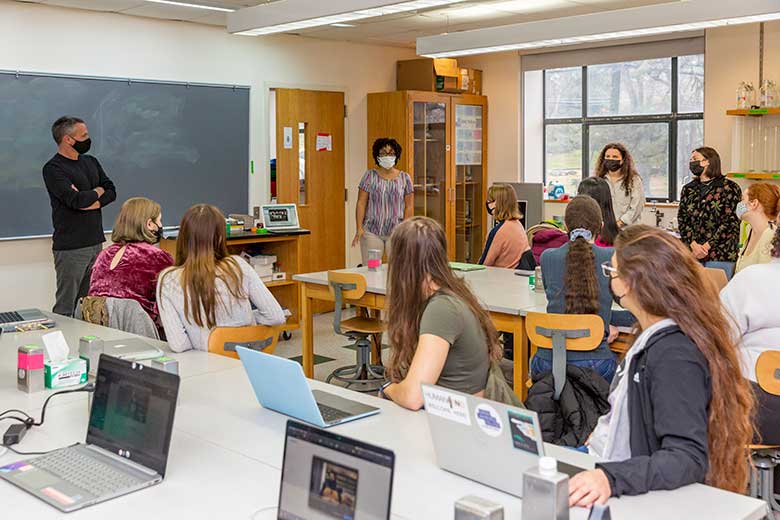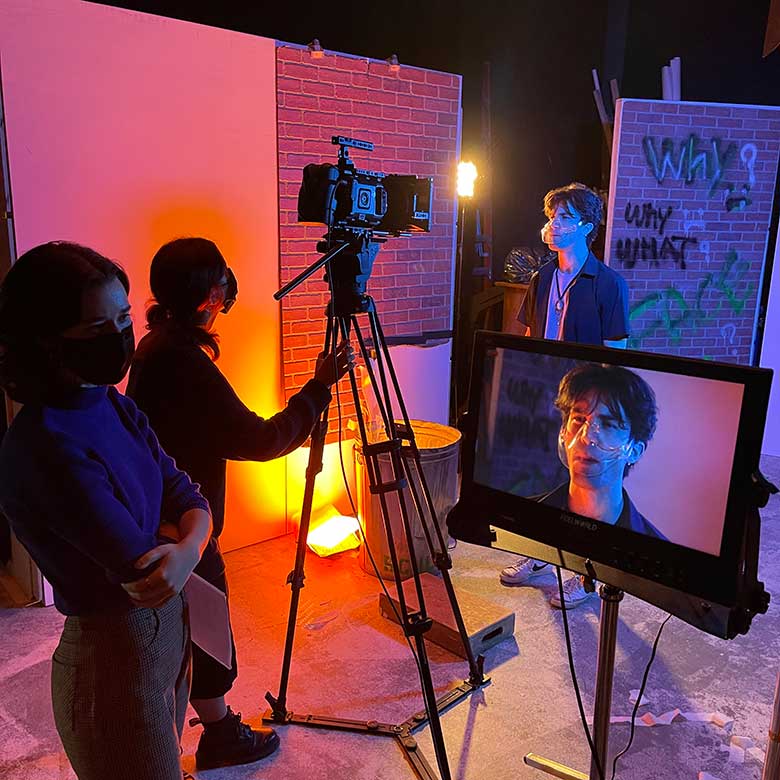Filed under:

Academic excellence, concern for the community, and the expansion of educational opportunity are all part and parcel of the mission of Sarah Lawrence College, and growing sustainably is integral to advancing those values and aspirations. To do this, the College is expanding its offerings by capitalizing on existing strengths and forging collaborations between graduate and undergraduate programs. These collaborations are poised to open up new vistas for current students and to provide attractive options for new applicants considering the College.
The Joan H. Marks Graduate Program in Human Genetics has been training genetic counselors for more than 50 years and is considered preeminent in the field. “It is the oldest and largest genetic counseling training program—not just in the country, but in the world,” says Claire Davis, co-director of the program.
“We’ve graduated over a thousand genetic counselors, and that’s out of 6,000 genetic counselors total.”
Genetic research is one of the most exciting areas of scientific inquiry today, and the research is leading to life-saving drugs and therapies, agricultural advances, and a better understanding of human origins and physiology. Along with these advances, however, comes the need for professionals who have the right mix of scientific expertise and counseling training to help people understand the ramifications of genetic information on their lives and well-being. The College is now in the process of creating new types of educational offerings in genetics, while also opening up areas of the program to undergraduate students so they can learn about the field or get a head start on a professional career.
“We’re looking at different ways in which we can educate people broadly in the area of genetics,” says Kanwal Singh, provost and dean of faculty. “The world still needs more genetic counselors than we can produce, but with the onslaught of information available to patients and consumers, it also needs professionals who can do the interpretive work that is important for a variety of sectors from healthcare systems to insurance to science writing. In addition, how can we intersect with students at the undergraduate level? For a long time, students studying genetics were doing it largely for pre-med preparation. There are so many more ways we can educate students in this field and leverage our expertise at the graduate level.”
Nursing and associated medical fields are also areas of opportunity for our students, says Kim Ferguson, dean of graduate and professional studies, and the Roy E. Larsen Chair in Psychology. “Though we don’t have a nursing program, we do educate a lot of students who go on to earn a master’s degree in nursing or other medical areas. Finding ways we can better support students at the intersection of genetics and health advocacy is one of the things we are exploring.”
The Sarah Lawrence approach—built into the genetics program—is what makes it unique, says Claire. “The kinds of conversations we have here enrich the original topic. What gets added in is a layer of ethics, a layer of humanism, a layer of cultural consideration.”
That range of intellectual breadth in the program is a huge appeal. “My students regularly tell me the most valuable element is really developing the ability to ask questions,” says Drew Cressman, professor of biology. “It’s very much the ethos of the program.”
Sarah Lawrence is proactively building on its strengths in other academic areas as well. For example, the College is expanding the undergraduate filmmaking program and has received permission to create an accredited MFA degree. “We’re in the planning stages now and are doing the preliminary work on logistics and recruiting,” Kanwal says. “We want the MFA to be part of a larger set of offerings in film, alongside the undergraduate degree and a very successful summer program we already have for pre-college and college students.”
 A premier aspect of the filmmaking program is its holistic and experiential method. Rather than specializing, students study and practice every area of filmmaking, from writing to shooting to editing and post-production. “A common thread through all our film programs is the insistence that to create good filmmakers, you can’t simply slot students into narrow channels like screenwriting or directing,” Kanwal explains.
A premier aspect of the filmmaking program is its holistic and experiential method. Rather than specializing, students study and practice every area of filmmaking, from writing to shooting to editing and post-production. “A common thread through all our film programs is the insistence that to create good filmmakers, you can’t simply slot students into narrow channels like screenwriting or directing,” Kanwal explains.
“One thing about what we do in film, which is similar to our core approach to genetics, is that we are taking a holistic and humanistic perspective,” says Kim. The diversified training and sense of inquiry that the filmmaking program offers add another dimension to the creative endeavor of filmmaking. “We’re not a conservatory or an art school,” Kanwal points out. “We get students here who are very strong in the arts, but they want—and we want—that liberal arts education to feed their art.”
Photo: Misael Sanchez